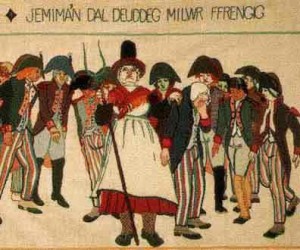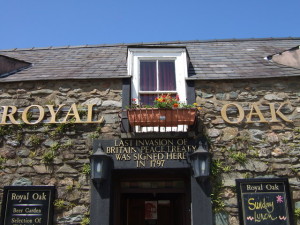This week in 1797, the French invaded Britain.
No kidding. We tend to think of 1066 as the last invasion, but a far less auspicious attempt took place in February, 1797, at a town called Fishguard in Wales. And it’s a great, bizarre story that has trappings of Gilbert & Sullivan and a heroine of a certain age.
The idea was that members of the French Légion Noire would storm Bristol, release the citizens from the king’s tyranny, and, march inland conquering all. But it didn’t work out that way. They were blown off course, and the Légion Noire was not so much a crack regiment as a regiment of crackheads, “the worst soldiers ever,” according to one of the commenters on this video. Most of them had been culled from prisons.
The first thing the gallant invaders did was to get drunk; a Portugese ship had grounded recently on the coast with a cargo of wine. Then, after some looting, they began to mutiny. And the good people of Fishguard, not very keen on the invaders gobbling up their wine and trashing their church, did not flock to the tricouleur.
Then things really got pear-shaped for the French who didn’t realize that Lord Cawdor, commander of the local militia, was hopelessly outnumbered. Had they been better soldiers things might have gone very differently. There’s a legend that the French, who probably couldn’t focus too well, saw  some local women in the Welsh national costume of red cloaks and tall black hats, and thought they were English soldiers. A tapestry on display in Fishguard depicts the legendary Jemima Fawr, (Jemima the Great) who, armed with a pitchfork, captured twelve soldiers, locked them in the church, and went out for more. She was 47 years old.
some local women in the Welsh national costume of red cloaks and tall black hats, and thought they were English soldiers. A tapestry on display in Fishguard depicts the legendary Jemima Fawr, (Jemima the Great) who, armed with a pitchfork, captured twelve soldiers, locked them in the church, and went out for more. She was 47 years old.
Two days after landing the French surrendered. A peace treaty was signed in the Royal Oak Inn on February 25.
 To add to the farcical elements of the story, the French officers broke their parole and escaped in Lord Cawdor’s yacht. Definitely not cricket.
To add to the farcical elements of the story, the French officers broke their parole and escaped in Lord Cawdor’s yacht. Definitely not cricket.
What I love about this story is that it has so many bizarre, incredible elements. What if the French had landed in Bristol, kept out of the pubs, and succeeded? (I used this in my book Jane and the Damned. If you’re going to have Jane Austen become a vampire you can do just about anything else you want). Or landed in Brighton–that was one of the hotspots for an invasion, which is why the regiment was sent there in P&P, not purely because it was a major party town.
Do you know any strange but true historical facts that are begging to have a story built around them?

Love this story. Thanks for sharing!
I can’t top this one, but I’ve always been interested in women who disguised themselves as men to enter the army or navy. I read about one of them, Phoebe Hessel, who disguised herself as a man and enlisted to be with her lover, whom she later married. After his death, she remarried and later, in her old age sold oranges on a street corner near the Brighton Pavilion. I gave her a cameo in SAVING LORD VERWOOD. Here’s a link to her story: http://en.wikipedia.org/wiki/Phoebe_Hessel
Love this, Janet!! I can’t top it either.
I knew this was the inspiration for Jane and the Damned. Or maybe Jane really was a vampire……